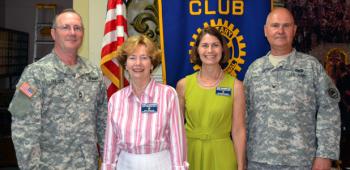
Master Sgt. Richard Bullock, left, and Col. Michael Borrel, right, presented the program at Tuesday’s Rotary Club of Crowley meeting, discussing the Louisiana National Guard’s Youth Challenge Program. Helping welcome Bullock and Borrel were, center from left, Rotarian Isabella delaHoussaye and President-Elect and program organizer, Mary Zaunbrecher.
Rotarians learn about state’s Youth Challenge Program
Jeannine LeJeune is the online editor for the Crowley Post-Signal. She can be reached at jeannine.lejeune@crowleytoday.com or 337-783-3450.
For many at-risk teenagers, life doesn’t hold a lot of hope and opportunities.
Since 1993, the Louisiana National Guard Youth Challenge Program has looked to change those circumstances for those who volunteer to become a part of its system.
The program offers at-risk adolescents (ages 16-18) an opportunity to change their future and, according to Col. Michael Borrel, it is working in Louisiana.
“It is a very rewarding program for me, as well as our staff,” he said at Tuesday’s meeting of the Rotary Club of Crowley. “The results are great.”
Louisiana, which has over 8,000 high school dropouts (though as Borrel points out that number does not account for the students that drop out before making it to high school), has three YCP facilities which through their eight core components, are making a big difference in many lives each year.
The program is broken down into two phases – phase one, 22 weeks residential where cadets learn self-discipline, leadership and responsibility all while working to obtain a high school general equivalency diploma; and phase two, 12 months of monitoring and mentorship outside of the facility’s walls.
During the first phase, participants live in military barracks and have access to a variety of classrooms, training resources and athletic fields. The cadets are supervised at all times and, unless participating in an authorized off-campus activity, must remain on campus. It is in this time that cadets are taught not only traditional academic subjects, though it does make up most of their days, but also life-coping skills, job skills, how to be a responsible citizen, how to be a good leader and follower, the correlation between good health and hygiene habits and a good and happy life and how to improve physical fitness. Cadets must also participate in a minimum of 40 hours of community service.
Borrel went over the basic day of a cadet with the Rotarians pointing out that cadets are awoken at 5:30 a.m., start classes at 8 a.m. and remain in school until 3:30 p.m. with a lunch break. After school, cadets participate in physical training or intramural sports, and some also attend more classes. Lights out for cadets is at 9 p.m.
During the residential 22 weeks, cadets are granted two family days (the first not scheduled until after the first seven weeks of the program), two home passes, the 40 or more hours of community service, field trips and outings, career exploration activities, academic testing and prom and graduation. Borel explained that the prom is the first time the male and female cadets are allowed to co-mingle and it is held the night before graduation. Graduation, meanwhile, is a huge event with standing room only always.
Louisiana’s YCP has three locations – Camp Minden, Camp Beauregard and Gillis W. Long Center. Classes begin every January and July at Camp Beauregard, located in Pineville; every February and August at Camp Minden, located in Minden; and every April and October at Gillis Long Center, located in Carville.
To learn more about the National Guard Youth Challenge Program, visit www.ngycp.org or Facebook.com/LouisianaYouthChallenge. You can also call 1-800-226-7543.
- Log in to post comments
